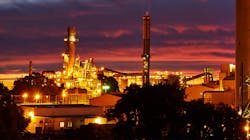Alcoa Details Possible $600M in R&D Spending Plans Through ‘24
Alcoa Corp. executives estimate they will spend around $600 million over the next three years should their research and development work on a handful of promising new technologies hit its benchmarks.
Outlining the path ahead for Pittsburgh-based Alcoa on the heels of reporting their fourth-quarter results, CEO Roy Harvey and CFO Bill Oplinger detailed some spending priorities for the coming quarters. Among those are restarting their Alumar smelter in Brazil and a portion of their Portland smelter in Australia. (In all, the company’s capital spending budget for the year is $525 million—versus $390 million in 2021—with $450 million allocated to sustaining projects and $75 million for growth initiatives.)
Looking further ahead, the Alcoa team also is pushing forward its R&D programs, for which it has up to $109 million in planned spending on the books this year. Those sustainability-focused projects include the Elysis zero-carbon smelting technology, the Astraea post-consumer scrap recycling process, mechanical vapor recompression technologies and work on high-purity alumina that can be used for lithium-ion batteries and energy-efficient LED lighting applications, among other things.
While emphasizing that these projects need to both prove they can be scaled up while also producing acceptable financial returns, Harvey said the $109 million that could be spent this year on them-with Elysis taking up $50 million of that—could grow to $252 million in 2023 and $240 million in 2024. For instance, the company will look to advance its high-purity alumina work throughout this year, entering the design process late in 2022. Should it prove to meet the required thresholds, Alcoa could spend up to $200 million on the project in 2023.
“We go through these stage gates to make sure that when we choose to invest capital, we're doing so in a project that […] will be successful—that we've been able to eliminate the technological risk—but at the same time, also have very good shareholder return,” Harvey said. “We need both the market side, but more importantly, the cost side to come in where we want to.”
In the three months ended Dec. 31, Alcoa posted a net loss of $392 million—which included a $1.1 billion in restructuring charges primarily from reworking pension plans—on sales of more than $3.3 billion. Adjusted profits were $475 million versus $49 million in the last three months of 2020.
Shares of Alcoa (Ticker: AA) were up more than 5% to roughly $63 heading into the lunch hour Jan. 20. Over the past six months, they have climbed more than 75%, growing the company’s market capitalization to nearly $12 billion.
About the Author
Geert De Lombaerde
Senior Editor
A native of Belgium, Geert De Lombaerde has been in business journalism since the mid-1990s and writes about public companies, markets and economic trends for Endeavor Business Media publications, focusing on IndustryWeek, FleetOwner, Oil & Gas Journal, T&D World and Healthcare Innovation. He also curates the twice-monthly Market Moves Strategy newsletter that showcases Endeavor stories on strategy, leadership and investment and contributes to other Market Moves newsletters.
With a degree in journalism from the University of Missouri, he began his reporting career at the Business Courier in Cincinnati in 1997, initially covering retail and the courts before shifting to banking, insurance and investing. He later was managing editor and editor of the Nashville Business Journal before being named editor of the Nashville Post in early 2008. He led a team that helped grow the Post's online traffic more than fivefold before joining Endeavor in September 2021.
